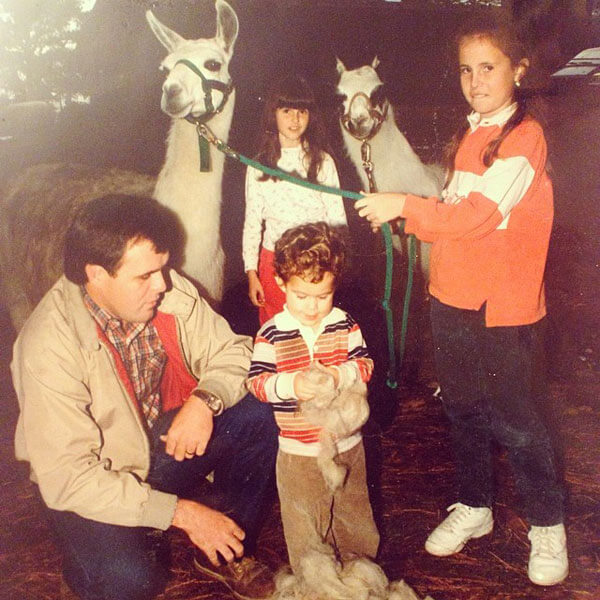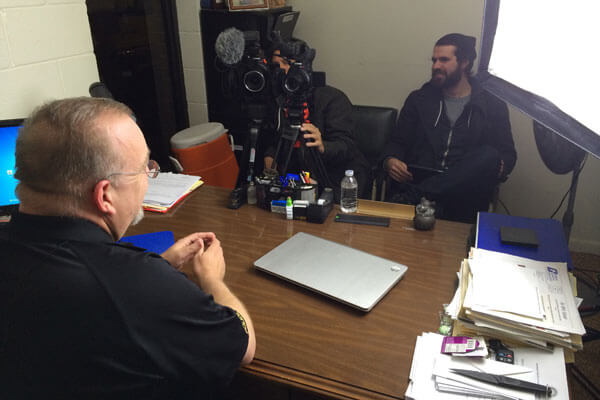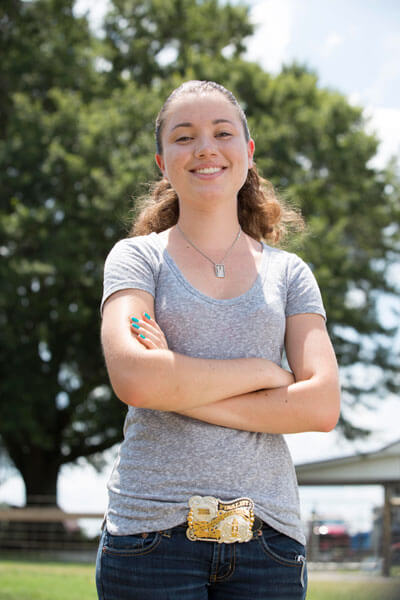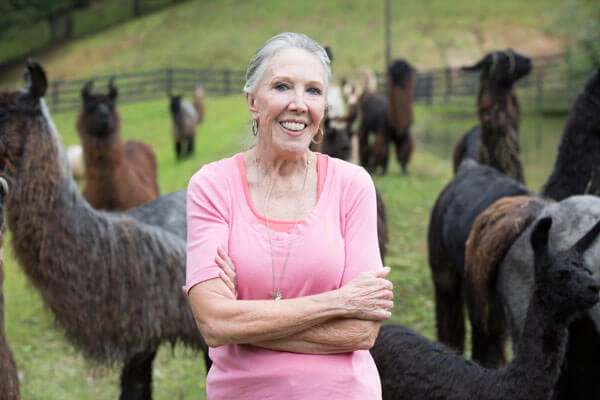Upcoming Documentary Captures Our Quirky “Llama Nation”
To get at the heart of our nation’s love for llamas, Tanner Shinnick traveled the country making “Llama Nation: The Documentary.”
Upcoming Documentary Captures Our Quirky “Llama Nation”
To get at the heart of our nation’s love for llamas, Tanner Shinnick traveled the country making “Llama Nation: The Documentary.”

Shinnick’s father, Ron Shinnick, has around 20 llamas, but does not like to reveal the exact count, a superstition that perfectly captures the quirkiness of llama owners (a demographic that is thriving in Cohutta thanks to the elder Shinnick). At the moment, the town sheriff has about six llamas, and the county judge also has a few.
Naturally, the younger Shinnick, 28, was brought up surrounded by llamas, caring for them and even competing in shows. Yes, llama shows. These events may sound like an excuse to gather together a bunch of adorable animals, in reality, they are demanding – similar to dog or horse shows and no less serious. They involve obstacle courses and jumping led by a handler, and the animals all need to be shiny and fluffed.
Despite his upbringing, these shows did not go well for Shinnick. “I was absolutely terrible at it,” he says. “I think the best I ever did was eighth place.”

Perhaps it was the lack of blue ribbons or just his love of film, but Shinnick left Cohutta in 2010 to attend the film program at Brigham Young University-Idaho. He now works as a commercial cinematographer in Salt Lake City, Utah, where he lives with his wife and no llamas.
In 2014, when Shinnick set out to direct his first film, he knew where to find his subjects.
Bolstered by nearly $17,000 raised on Kickstarter, Shinnick started work on a feature-length documentary exploring the uncommon existence of people – like his father – who are obsessed with llamas. He ended up visiting 15 states over the course of a year.
On his odyssey through llama country, Shinnick encountered people and communities with long histories of breeding, trekking, carting, and showing llamas, who were in no way influenced by the animals’ sudden pop-culture popularity. “They have this weird knack and love for this animal that you don’t have for other animals,” Shinnick says. “It’s kind of like a crazy cat lady but with, like, 100 llamas.”

“Llama Nation: The Documentary“ will debut on the American film festival circuit in 2016 and be available to stream next summer. The film was submitted to major festivals, including Sundance, Tribeca, and South by Southwest.
It features a diverse lineup of llamas and their owners, but its main storyline follows two teens – Janessa Hall of Dobson, North Carolina, and Hunter Snow of Monroe, Georgia – who are competing against each other for a championship title with the Alpaca Llama Show Association.
While we won’t spoil the outcome, it’s safe to say that both teens, though friendly toward one another, competed hard for the title, each employing their own approach to showing. Snow has more than 10 llamas she rotates through. Hall, however, has a go-to llama, Pongo, that she trained from a young age. “She has a huge bond with this animal,” Shinnick says.


Then there’s Shinnick’s supporting cast: In Portland, he followed Rojo, a popular therapy llama who wears costumes while greeting the elderly. “He’s a celebrity [in Portland],” Shinnick says. “Whenever we went out to film, random people just knew about Rojo. Portland’s kind of the perfect city for that. Llamas are a little bit weird, and Portland’s a little bit weird.”
Shinnick also spent a lot of time filming back in his home state. There in Georgia, he found more subjects featured in the documentary, including a woman he calls the “godmother of llama showing,” Tracy Pearson. She owns Pearson Pond Ranch and Llama Co. in Ellijay, home to nearly 200 show-quality llamas.

Pearson knows the history of llamas in the United States inside and out, Shinnick says. She can tell you about how, in the 1990s llamas sold for thousands each – up to $100,000 – until the bubble burst, so the speak. Now llamas can sell for as little as $100.
Pearson’s ranch is just an hour from Cohutta, where Shinnick returned to capture his father carting llamas (think horse and buggy, minus the horse). Ron Shinnick is well regarded in the llama world, and a minor player in the documentary. He’s known as the Llama Carting King, according to his son, having self-published a how-to guide on the subject that sold 3,000 copies.
Even though Tanner Shinnick doesn’t see himself ever again owning camelids, he can easily sum up their appeal and what he hopes will make people watch his film: “They’re just kind of awkward looking,” he says, “and funny and cool all at the same time. You can’t look at a llama and not have a smile on your face.”
You can view the film’s trailer below:
Follow us

This work is licensed under a Creative Commons Attribution-NoDerivatives 4.0 International License.
Want to republish a Modern Farmer story?
We are happy for Modern Farmer stories to be shared, and encourage you to republish our articles for your audience. When doing so, we ask that you follow these guidelines:
Please credit us and our writers
For the author byline, please use “Author Name, Modern Farmer.” At the top of our stories, if on the web, please include this text and link: “This story was originally published by Modern Farmer.”
Please make sure to include a link back to either our home page or the article URL.
At the bottom of the story, please include the following text:
“Modern Farmer is a nonprofit initiative dedicated to raising awareness and catalyzing action at the intersection of food, agriculture, and society. Read more at <link>Modern Farmer</link>.”
Use our widget
We’d like to be able to track our stories, so we ask that if you republish our content, you do so using our widget (located on the left hand side of the article). The HTML code has a built-in tracker that tells us the data and domain where the story was published, as well as view counts.
Check the image requirements
It’s your responsibility to confirm you're licensed to republish images in our articles. Some images, such as those from commercial providers, don't allow their images to be republished without permission or payment. Copyright terms are generally listed in the image caption and attribution. You are welcome to omit our images or substitute with your own. Charts and interactive graphics follow the same rules.
Don’t change too much. Or, ask us first.
Articles must be republished in their entirety. It’s okay to change references to time (“today” to “yesterday”) or location (“Iowa City, IA” to “here”). But please keep everything else the same.
If you feel strongly that a more material edit needs to be made, get in touch with us at [email protected]. We’re happy to discuss it with the original author, but we must have prior approval for changes before publication.
Special cases
Extracts. You may run the first few lines or paragraphs of the article and then say: “Read the full article at Modern Farmer” with a link back to the original article.
Quotes. You may quote authors provided you include a link back to the article URL.
Translations. These require writer approval. To inquire about translation of a Modern Farmer article, contact us at [email protected]
Signed consent / copyright release forms. These are not required, provided you are following these guidelines.
Print. Articles can be republished in print under these same rules, with the exception that you do not need to include the links.
Tag us
When sharing the story on social media, please tag us using the following: - Twitter (@ModFarm) - Facebook (@ModernFarmerMedia) - Instagram (@modfarm)
Use our content respectfully
Modern Farmer is a nonprofit and as such we share our content for free and in good faith in order to reach new audiences. Respectfully,
No selling ads against our stories. It’s okay to put our stories on pages with ads.
Don’t republish our material wholesale, or automatically; you need to select stories to be republished individually.
You have no rights to sell, license, syndicate, or otherwise represent yourself as the authorized owner of our material to any third parties. This means that you cannot actively publish or submit our work for syndication to third party platforms or apps like Apple News or Google News. We understand that publishers cannot fully control when certain third parties automatically summarize or crawl content from publishers’ own sites.
Keep in touch
We want to hear from you if you love Modern Farmer content, have a collaboration idea, or anything else to share. As a nonprofit outlet, we work in service of our community and are always open to comments, feedback, and ideas. Contact us at [email protected].by Liz Skalka, Modern Farmer
October 16, 2015
Modern Farmer Weekly
Solutions Hub
Innovations, ideas and inspiration. Actionable solutions for a resilient food system.
ExploreExplore other topics
Share With Us
We want to hear from Modern Farmer readers who have thoughtful commentary, actionable solutions, or helpful ideas to share.
SubmitNecessary cookies are absolutely essential for the website to function properly. This category only includes cookies that ensures basic functionalities and security features of the website. These cookies do not store any personal information.
Any cookies that may not be particularly necessary for the website to function and are used specifically to collect user personal data via analytics, ads, other embedded contents are termed as non-necessary cookies.